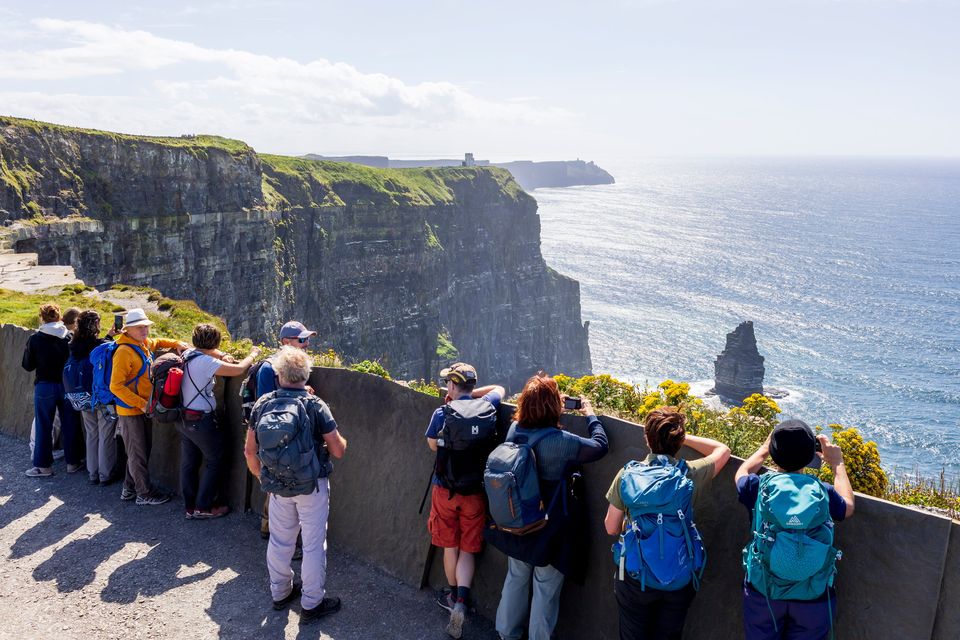Top Stories
Ireland Urged to Diversify Tourism Amid Visitor Decline

Ireland’s tourism sector faces significant challenges as recent data indicates a sharp decline in visitor numbers. The Irish Tourism Industry Confederation (ITIC) has emphasized the need for the country to “diversify” its tourism market, reducing its reliance on North American visitors to regain a competitive edge in Europe.
According to figures released by Fáilte Ireland, there has been an 18% decline in tourists from all major overseas markets between January and April 2024 compared to the same period in 2023. The drop in visitor numbers has raised alarms, particularly as revenue from tourists in Great Britain plummeted by 52%, followed by 55% for French holidaymakers and 53% for German visitors.
Eoghan O’Mara Walsh, chief executive of the ITIC, noted that several complex economic factors contribute to this decline. He explained that the weakened US dollar, which has declined by approximately 15% in recent months, is affecting American travel to Ireland. In addition, ongoing tariffs and geopolitical uncertainties are further complicating the situation for the tourism sector.
In an interview with RTÉ Radio 1, Walsh stated, “We need to defend and deepen the US market because we can’t just turn our back on our most valuable market. But we do need to be more active and penetrate other markets.” This proactive approach is vital for addressing the dwindling numbers of US tourists, who have traditionally played a crucial role in Ireland’s tourism landscape.
Tourism in Ireland is not only a major contributor to the economy but also the country’s largest indigenous industry, providing jobs for 257,900 people across various sectors. However, the high cost of travel to Ireland poses an additional challenge. According to Eurostat, Ireland ranks as the second-most expensive holiday destination in Europe, which may deter potential visitors. Walsh highlighted that economic struggles in Germany, France, and Great Britain lead to tighter discretionary income for consumers, resulting in sacrifices on second and third holiday destinations.
To combat these challenges, Walsh advocates for raising the current passenger cap at Dublin Airport to more than 32 million to facilitate greater access for overseas visitors. He remarked, “We are an island nation. There’s no roads and no bridges, no tunnels off the island. If we want to activate and we want to secure access to our key source markets, we need headroom at Dublin Airport.”
Despite the pressing need for change, Walsh expressed concern about the slow pace of progress, stating, “Government has had an awful lot of time to debate it and tease it out, and we’re still at the same stage as we have been for a long time.”
Additionally, he emphasized the importance of regional airports in expanding Ireland’s tourism reach, suggesting that the government should enhance support for these airports to incentivize airlines to increase flights to less accessible areas of the country.
As Ireland navigates these challenges, industry leaders will need to adopt innovative strategies to revitalize the tourism sector and embrace a broader market approach. The focus on diversifying tourism sources and enhancing accessibility could play a pivotal role in ensuring the sector’s recovery and long-term sustainability.
-

 Top Stories3 months ago
Top Stories3 months agoTributes Surge for 9-Year-Old Leon Briody After Cancer Battle
-

 Entertainment4 months ago
Entertainment4 months agoAimee Osbourne Joins Family for Emotional Tribute to Ozzy
-

 Politics4 months ago
Politics4 months agoDanny Healy-Rae Considers Complaint After Altercation with Garda
-

 Top Stories4 months ago
Top Stories4 months agoIreland Enjoys Summer Heat as Hurricane Erin Approaches Atlantic
-

 World5 months ago
World5 months agoHawaii Commemorates 80 Years Since Hiroshima Bombing with Ceremony
-

 Top Stories3 months ago
Top Stories3 months agoNewcastle West Woman Patricia Foley Found Safe After Urgent Search
-

 Top Stories5 months ago
Top Stories5 months agoFianna Fáil TDs Urgently Consider Maire Geoghegan-Quinn for Presidency
-

 World5 months ago
World5 months agoCouple Convicted of Murdering Two-Year-Old Grandson in Wales
-

 World5 months ago
World5 months agoGaza Aid Distribution Tragedy: 20 Killed Amid Ongoing Violence
-

 World5 months ago
World5 months agoAristocrat Constance Marten and Partner Convicted of Infant Murder
-

 Top Stories4 months ago
Top Stories4 months agoClimbing Errigal: A Must-Do Summer Adventure in Donegal
-

 Top Stories4 months ago
Top Stories4 months agoHike Donegal’s Errigal Mountain NOW for Unforgettable Summer Views









